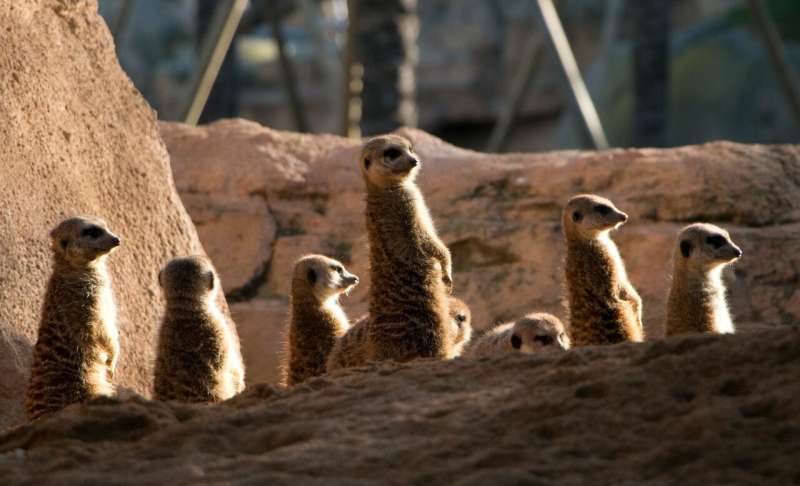Scientists monitor meerkats' response to returning zoo visitors

Experts in animal behavior at Nottingham Trent University, Harper Adams University and Twycross Zoo studied the behavior of meerkats at several zoos both during lockdown when there were suddenly no visitors, and then again for a month after zoos reopened to the public.
As part of the pilot study—the first to look at animal behavior as a result of zoo closures—they found that the slender tailed meerkats showed increased positive social interactions with one another, such as play and social grooming, once visitors returned, and at some zoos there was an increase in positive human-animal interactions too.
Meerkats also showed an increase in 'alert behaviors' such as increased vigilance, which the researchers say could be indicative of a natural curiosity in meerkats, particularly after a long absence of seeing visitors.
Visitors are normally a prominent and constant feature in a zoo animals' environment, with more than 700 million people visiting zoos and aquariums worldwide each year.
Research has previously shown that animal-visitor interactions can be enriching and stimulating for zoo animals, but worldwide closures of zoos during the pandemic led to an abrupt stop in visitor interactions for all species housed.
Since zoo closures were implemented, anecdotal zoo reports have indicated mixed behavioral responses in a number of species, including animals 'hiding' from staff due to a lack of people around their enclosures and calling to keepers to attract attention.
"The presence of indicators of positive welfare within the group, including positive social interactions and engaging in positive human-animal interactions, suggest the return of visitors was a positive and engaging experience for the meerkats," said Dr. Samantha Ward, a scientist in Nottingham Trent University's School of Animal, Rural and Environmental Sciences.
She said: "It's not always clear how certain animals that are used to humans will react to the changes that we are all currently experiencing but it was promising to see that for these meerkats, they were glad to welcome back the visitors."
Dr. Ellen Williams, a former NTU researcher and now based at Harper Adams University, said: "Meerkats are a popular species in terms of presence in zoos and are considered to be species that visitors are keen to see and are often used as 'ambassador' species, coming into close contact with the public through personal experience or encounter programs.
"This work is extremely important in future evidence-based approaches to the management of zoo animals, such as including consideration of enclosure location and design and ensuring positive visitor experiences which do not negatively impact on animal behavior and welfare."
The researchers have further data to analyze and suggest that more work needs to be undertaken over a longer period of time to better understand how certain species adjust to zoo visitors and the true nature of the effects of visitors upon animal behavior.
The study, which also involved NTU's Dr. Anne Carter and Twycross Zoo's Dr. Jessica Rendle, is published in the journal Applied Animal Behavior Science.
More information: Ellen Williams et al. Understanding impacts of zoo visitors: Quantifying behavioural changes of two popular zoo species during COVID-19 closures, Applied Animal Behaviour Science (2021). DOI: 10.1016/j.applanim.2021.105253
Journal information: Applied Animal Behaviour Science
Provided by Nottingham Trent University




















